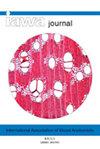Volumetric imaging by micro computed tomography: a suitable tool for wood identification of charcoal
IF 3.5
3区 农林科学
Q2 FORESTRY
引用次数: 0
Abstract
The present study focuses on the application of state-of-the-art μCT, by using a sub-micrometre CT scanner as a tool for wood identification. Charcoal was chosen as a subject for this case study. The reason for choosing charcoal is based on economic as well as technical issues. Parallel to conventional wood anatomy, various promising approaches to identification are currently being developed worldwide in order to simplify the identification of processed wood. However, due to the carbonization process, such approaches are not applicable to charcoal. In view of the rapid development of μCT technology, it was decided to examine the extent to which wood anatomical studies can be supported and improved by modern μCT technology. About 17% of the annually harvested wood worldwide is converted to charcoal (FAO 2017), and the charcoal trade is one of the least controlled/monitored segments of the European timber market. Although charcoal has a significant market share of wood-based products, it is still not yet covered by any trade regulation, e.g. the European Timber Regulations (EUTR), (EU) No995/2010. For the present study, different wood types and the anatomical fine structural features were measured and displayed at different magnifications to visualize the performance of state-of-the-art μCT standards. Three different charcoal assortments were examined, and the results were checked against the given declarations of contents. The aim of this work is to evaluate the potential of the μCT technique in the field of wood identification and to assess its use for the regulatory control of charcoal and other wood products in the international timber trade. The results are encouraging and lead to the conclusion that the application of the μCT technique in the field of wood identification can be classified as very promising for the future.微型计算机断层扫描体积成像:一种适用于木炭木材鉴定的工具
本研究着重于应用最先进的μCT,利用亚微米CT扫描仪作为木材识别的工具。木炭被选为本案例研究的主题。选择木炭的原因既有经济方面的考虑,也有技术方面的考虑。与传统的木材解剖平行,目前世界各地正在开发各种有前途的鉴定方法,以简化加工木材的鉴定。然而,由于炭化过程的原因,这些方法不适用于木炭。鉴于μCT技术的迅速发展,决定对现代μCT技术在多大程度上支持和改进木材解剖研究进行研究。全球每年采伐的木材中约有17%被转化为木炭(粮农组织2017年),木炭贸易是欧洲木材市场中控制/监测最少的部分之一。尽管木炭在木基产品中占有很大的市场份额,但它仍未被任何贸易法规所涵盖,例如欧洲木材法规(EUTR), (EU) No995/2010。在本研究中,测量了不同的木材类型和解剖精细结构特征,并在不同的放大倍数下显示,以直观地显示最先进的μCT标准的性能。检查了三种不同的木炭分类,并根据给定的内容声明对结果进行了检查。这项工作的目的是评估μCT技术在木材鉴定领域的潜力,并评估其在国际木材贸易中对木炭和其他木制品的监管控制中的应用。结果令人鼓舞,μCT技术在木材鉴定领域具有广阔的应用前景。
本文章由计算机程序翻译,如有差异,请以英文原文为准。
求助全文
约1分钟内获得全文
求助全文
来源期刊

IAWA Journal
农林科学-林学
CiteScore
3.40
自引率
15.80%
发文量
26
审稿时长
>36 weeks
期刊介绍:
The IAWA Journal is the only international periodical fully devoted to structure, function, identification and utilisation of wood and bark in trees, shrubs, lianas, palms, bamboo and herbs. Many papers are of a multidisciplinary nature, linking
 求助内容:
求助内容: 应助结果提醒方式:
应助结果提醒方式:


